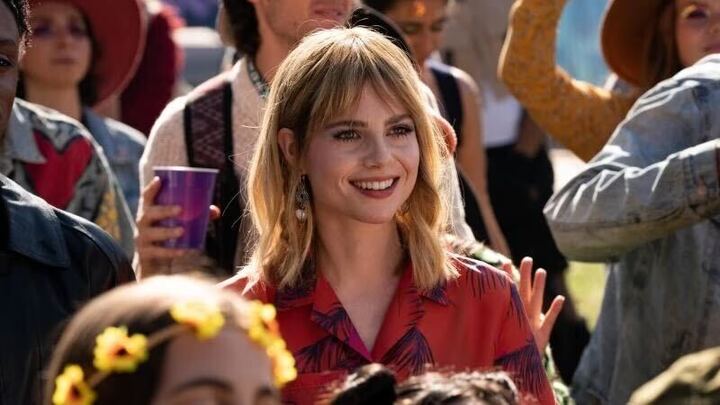
The idea of time travel is not new to the screen, making its first cinematic appearance in the 1920s. Over the years, movies like “Back to the Future,” “Bill & Ted’s Excellent Adventure,” “Interstellar” and “X-Men: Days of Future Past” have all taken their own stab at going backward and forward in time, with varying degrees of success.
Though widely considered a science-fiction concept, time travel has far transcended traditional genre boundaries, playing an important role in action movies, thrillers, comedies, horror movies and even romantic comedies. Some genres use the concept more than others, with romance movies falling on the rarer side. That is one thing that makes the new romance fantasy film “The Greatest Hits” stand out from the plethora of time travel films that have come before it.
“The Greatest Hits” tells a story of loss, grief, connection and healing as it follows Harriet Gibbons (Lucy Boynton), a young woman struggling with the death of her boyfriend, Max (David Corenswet). Despite two years having passed since his death, Harriet is still struggling to move on, especially when she finds herself being literally pulled back in time whenever she hears a song that was playing during a moment in her and Max’s life together. While she wears noise-canceling headphones out in public, at nights in her apartment, she searches through assorted vinyl records for moments in time that she can change in order to prevent him from dying. One day, a man named David Park (Justin H. Min) joins the same grief support group that Harriet attends. From there, she quickly becomes caught between the past and the present, constantly revisiting her tragic lost romance while a new one begins to take shape.
Typically, movies use advanced technology or superpowers to bring characters back in time or project them forward. However, Harriet’s jumps are prompted by songs that are associated with specific memories, something that writer and director Ned Benson feels “profoundly impacted [by].”
The movie may focus on the idea of grief, but it is not as bleak as it may sound. During a recent roundtable interview, Benson explained, “one of the solves for me during COVID was music, not only in the sense that it reminded me of the life that I had lived and brought me back to so many moments in my life, but it also reminded me to properly live again, to dance and to reengage in experience, and I think the communal aspect of the medium of music is so special because it’s something we all share.”
This connection through music is shown repeatedly in the movie in ways that do not just link to Harriet’s grief. Her best friend Morris Martin (Austin Crute) is a small-time DJ who supports Harriet through her loss. She and David also have their first significant interaction while looking through records and later bond over karaoke. Music is something that connects Harriet to the past but it also connects her to her present. Benson says, “Harriet is someone who’s trying to figure out how to engage with life again and how to live again and embrace experience again. And I think music is…this double edged sword of it [that] holds her back, but it also reminds her to live.”
While the pacing drags at some points, “The Greatest Hits” is an innovative take on the time travel narrative, with deep themes of connection through loss, music, and the importance of finding meaning. Boynton and Min do a great job of bringing their characters to life, portraying the different ways that people experience, and heal from, loss.
The post The Greatest Hits’ provides a new take on time travel appeared first on Technique.
